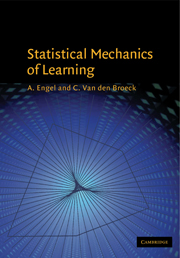Book contents
- Frontmatter
- Contents
- Preface
- 1 Getting Started
- 2 Perceptron Learning – Basics
- 3 A Choice of Learning Rules
- 4 Augmented Statistical Mechanics Formulation
- 5 Noisy Teachers
- 6 The Storage Problem
- 7 Discontinuous Learning
- 8 Unsupervised Learning
- 9 On-line Learning
- 10 Making Contact with Statistics
- 11 A Bird's Eye View: Multifractals
- 12 Multilayer Networks
- 13 On-line Learning in Multilayer Networks
- 14 What Else?
- Appendices
- Bibliography
- Index
7 - Discontinuous Learning
Published online by Cambridge University Press: 05 June 2012
- Frontmatter
- Contents
- Preface
- 1 Getting Started
- 2 Perceptron Learning – Basics
- 3 A Choice of Learning Rules
- 4 Augmented Statistical Mechanics Formulation
- 5 Noisy Teachers
- 6 The Storage Problem
- 7 Discontinuous Learning
- 8 Unsupervised Learning
- 9 On-line Learning
- 10 Making Contact with Statistics
- 11 A Bird's Eye View: Multifractals
- 12 Multilayer Networks
- 13 On-line Learning in Multilayer Networks
- 14 What Else?
- Appendices
- Bibliography
- Index
Summary
So far we have been considering learning scenarios in which generalization shows up as a gradual process of improvement with the generalization error ε decreasing continuously from its initial pure guessing value ε = 0.5 to the asymptotic limit ε = 0. In the present chapter we study systems which display a quite different behaviour with sudden changes of the generalization ability taking place during the learning process. The reason for this new feature is the presence of discrete degrees of freedom among the parameters, which are adapted during the learning process. As we will see, discontinuous learning is a rather subtle consequence of this discreteness and methods of statistical mechanics are well suited to describe the situation. In particular the abrupt changes which occur in the generalization process can be described as first order phase transitions well studied in statistical physics.
Smooth networks
The learning scenarios discussed so far have been described in the framework of statistical mechanics as a continuous shift of the balance between energetic and entropic terms. In the case of perfect learning the energy describes how difficult it is for the student vector to stay in the version space (see (2.13)). For independent examples it is naturally given as a sum over the training set and scales for large α as e ∼ αε since the generalization error ε gives the probability of error and hence of an additional cost when a new example is presented.
- Type
- Chapter
- Information
- Statistical Mechanics of Learning , pp. 109 - 124Publisher: Cambridge University PressPrint publication year: 2001



